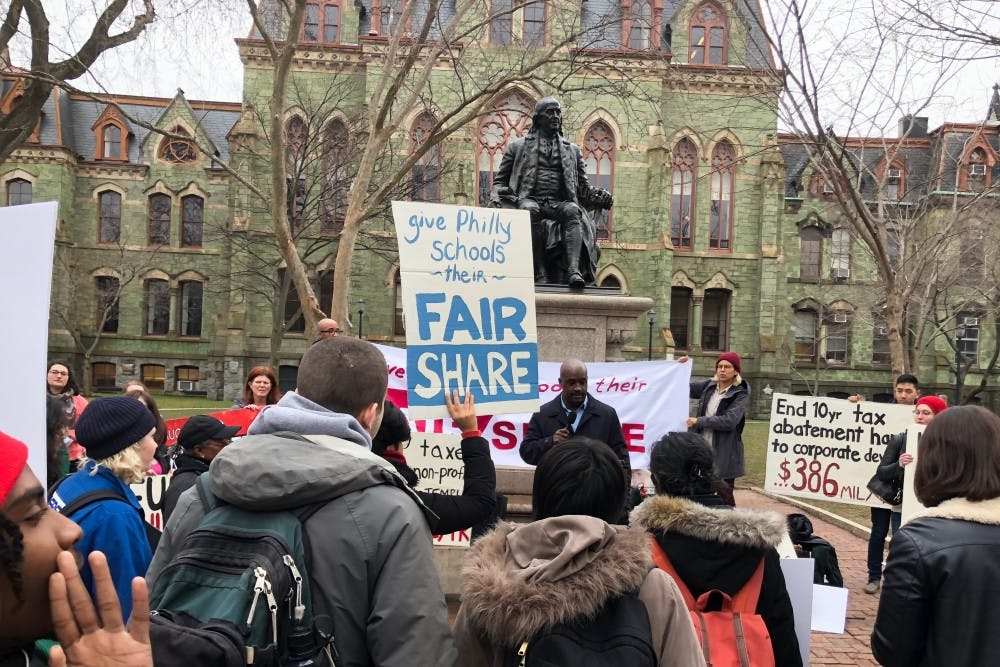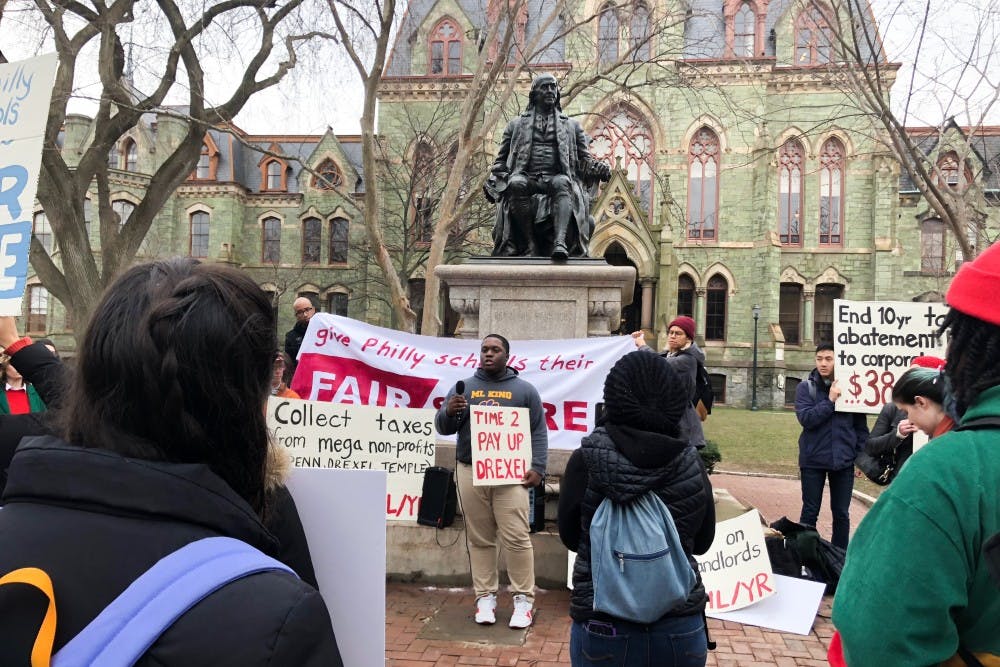
Chants of “Pay your fair share!” filled the air outside College Hall on Wednesday afternoon as a group of about 50 protesters campaigned for an increase in funding for Philadelphia public schools, challenging Penn to give more back to the city's school system.
Co-organized by Our City Our Schools and the Penn Chapter of Student Labor Action Project, the rally featured speeches from students, parents, and teachers of the Philadelphia public school system.
Antoine Little, the chair of the Our City Our Schools Coalition, described the organization’s goal to raise hundreds of millions of dollars in revenue in order to properly fund public schools.
According to the organization's Proposal for Equitable School Funding in 2018, it proposes the end of the city's 10-year tax abatement, the postponement of reductions to the business income tax, the increase of the use and occupancy tax to 1.5 percent of property value, and the collection of PILOTs — Payments in Lieu of Taxes.

In 2015, dozens of students marched through campus, protested outside College Hall, and distributed petitions calling on the University to pay $6.6 million in aid to the city's schools. Just last month, SLAP reignited debate over the issue by hosting a protest in the snow.
“Imagine what our schools could be if the 1 percent of this city paid their fair share?” Little said. “You could have books in every classroom, counselors in every school, nurses in every school, and you could lower the amount of students in classrooms.”
PILOTs refer to payments willingly made by nonprofit organizations to their local governments in place of property tax. As a nonprofit, Penn is exempt from paying property taxes under the tax code even though it is the largest private employer in the city.
In the past, Penn has cited the economic benefits it gives the city, such as adding jobs to the local economy and contributing $2 million annually to the University City District, as a reason for not participating in PILOT agreements.
Various other private universities, including Harvard University, Yale University, Princeton University, Dartmouth College, Cornell University, and Brown University are also exempt from these taxes, but choose to make payments to their local government through PILOTs agreements.
Penn and Columbia University are the only two Ivies that do not make such payments.
Catherine Blunt, a member of the Philadelphia People’s School Board slate and retired educator, said she was at the protest to stand up for the right to public education for the 200,000 Philadelphia public school students.
Blunt described the worrying trend of school closings in Philadelphia, which she said hit economically-depressed and socially-marginalized neighborhoods the hardest.
“It is time for these corporations and the wealthy benefiting from President Trump’s generous tax breaks to share their unwarranted bonuses with the children of this city,” Blunt said.
This observation was corroborated by Little, who mentioned the multitude of schools that were closing in his North Philly neighborhood.

“Black and brown communities are being taken under siege by a system that is designed to fail our children, and what we cannot and will not do, is stand back and allow it to happen,” Little said.
Martin Luther King High School senior Michael Xavier Samuel described his personal struggles with a lack of school funding.
Samuel said he realized how concerning the problem had become when he was looking at his school’s past yearbooks and realized many programs, such as a drama program, a marching band, and a swim team that had once existed, had vanished.
The school district, which has the eighth largest student enrollment in the nation, has been consistently plagued with funding issues.
Just last week, the School Reform Commission approved the basics of a new $3.2 billion budgetary plan for the system. The proposal depends heavily upon city money promised by Mayor Jim Kenney and does not call for additional school closures.
The budget proposal provides a possible solution to funding issues, including those mentioned by past projections which forecast that the school district would face a $105 million deficit by fiscal year 2019.
In addition, Samuel characterized schools as a pipeline to the jail system, describing schools as oppressive environments in which children are stripped of individuality and forced to fit into a system.
“It’s systematic in the breaking down of our minds,” Samuel said. “With more school funding we can afford to have more books, more programs, more things where kids can find themselves and find what they want to do with their lives.”

College junior Aiden Castellanos-Pedroza said the initial happiness at receiving a full scholarship from Penn was quickly negated by his discovery of the University's role in the gentrification of West Philadelphia.
“I was honestly ashamed; being here is absolutely disgusting,” Castellanos-Pedroza said. “Penn has hurt so many people here in Philadelphia, and Penn has the opportunity to be able to give something back. This is all we are asking for, for them to go over and pay their fair share.”
Castellanos-Pedroza described Penn’s decision to build a new dorm as questionable, in the face of the struggling condition of many Philadelphia public schools, and noted that the University's granting of scholarships does not exempt the institution from assisting public education in the city.
“Don’t use me as a reason for why you will take advantage of the rest of the city. Don’t use me as an opportunity for you to take opportunities away from others,” Castellanos-Pedroza said.
The participants' calls for Penn to play a larger role in funding Philadelphia public education are not new.
The Daily Pennsylvanian is an independent, student-run newspaper. Please consider making a donation to support the coverage that shapes the University. Your generosity ensures a future of strong journalism at Penn.
Donate






